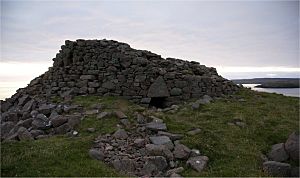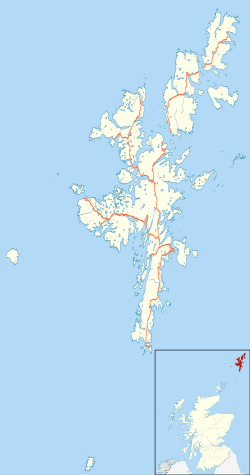Broch of Culswick facts for kids

Broch of Culswick
|
|
| Location | Mainland, Shetland |
|---|---|
| Coordinates | 60°11′13″N 1°32′39″W / 60.186958°N 1.544124°W |
| Type | Broch |
| History | |
| Periods | Iron Age |
The Broch of Culswick is an ancient stone tower found by the sea in the Shetland Islands of Scotland. It's also known as Culswick Broch. This amazing old building gives you great views of nearby islands like Foula and Vaila. You can also see Fitful Head and Fair Isle to the south.
The broch sits on top of a rocky platform. At its highest point, it stands about 3 meters tall. Over many years, lots of stones have fallen into the middle of the tower. The entrance has a very large, triangular stone above it, which is called a lintel. This doorway is partly filled with fallen rocks. Old drawings from 1774 and 1805 show that the broch was in much better shape back then.
What is a Broch?
A broch is a special kind of ancient stone tower. People built them during the Iron Age, which was thousands of years ago. These towers are only found in Scotland, especially in the northern parts and islands. They were likely used as homes or safe places for families and their communities. Brochs are known for their thick, hollow walls.
Where to Find the Broch of Culswick
The Broch of Culswick is located on Mainland, Shetland, which is the largest island in Shetland. It's about one kilometer west of a small area also called Culswick. The broch is built on a steep, smooth hill very close to cliffs and the ocean. Its position was probably chosen to give a good view of the surrounding area and the sea.
Exploring the Broch's Design
The Broch of Culswick is quite large. Its outer measurement is about 16 meters across. The walls that are still standing are as tall as 3.5 meters in some places. You can clearly see the main entrance, but it's mostly blocked by fallen stones. The huge triangular stone above the doorway is very noticeable.
To the right of the main entrance, there was once a small room called a "guard cell." This room might have been used by a guard or for storage. The inside of the broch is currently full of debris and fallen rocks. If you look closely, you can see parts of an upper walkway or gallery inside the wall above the entrance. There's also another opening or doorway visible in the inner wall.
In 1774, an artist named George Low drew the Culswick Broch. His drawing shows that it was much better preserved back then. It had three complete walkways, or "intra-mural galleries," built within its thick walls, above the buried lower floor. There was also a special ledge on the inside wall, called a scarcement ledge. This ledge might have supported a wooden floor or roof.
 | Jackie Robinson |
 | Jack Johnson |
 | Althea Gibson |
 | Arthur Ashe |
 | Muhammad Ali |


